May 16, 2025. 100-Day Dharma Talk – Day 89, Friday Dharma Q&A
Hi. This is the 89th day of Venerable Pomnyun Sunim’s 100-Day Dharma Talk. Today is Friday, when anyone can participate in the public Dharma Q&A session. Heavy rain has been pouring all day in Seoul.
After completing his morning practice and meditation, Sunim headed to the Jungto Social and Cultural Center to conduct the Friday Dharma Q&A session. Volunteers had arrived early to welcome citizens who came to attend the Q&A.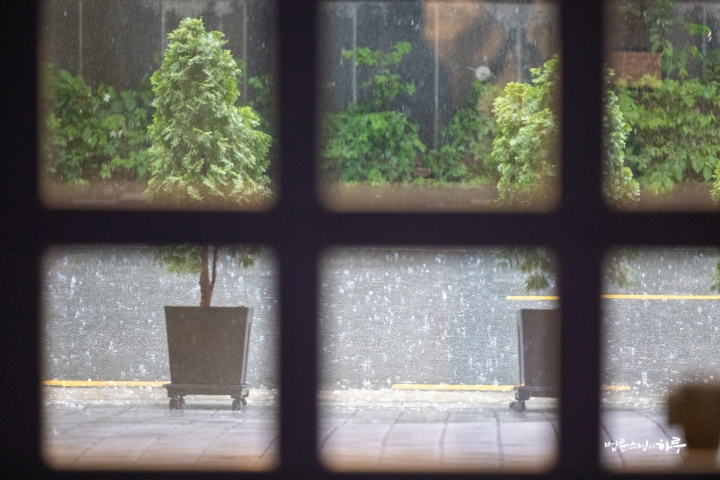
At 10:15 AM, the YouTube livestream began, and everyone recited the Three Refuges and Words for Practice together. About 220 people were present in the audience, while approximately 3,500 viewers were connected to the YouTube livestream as the dialogue began.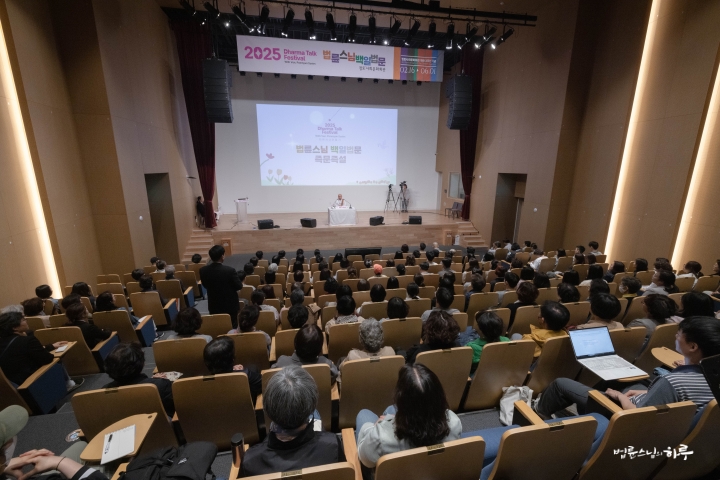
During the hour and a half session, three people asked Sunim questions. One of them explained that he had entered divorce mediation with his wife and was feeling a sense of helplessness, as if his life was falling apart. He asked Sunim for advice on how to recover from this emotional state.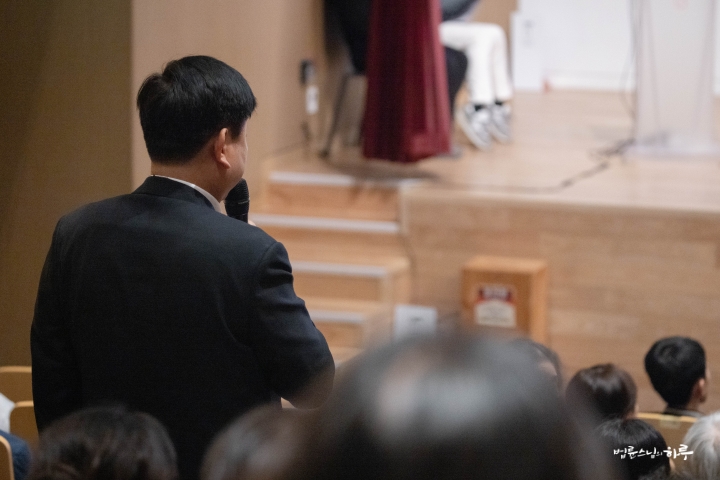
After filing for divorce, my life feels shattered. What should I do?
The questioner was tearful, stumbling over his words as he struggled to ask Sunim his question.
“Listening to you speak, you’re sobbing as if something terrible has happened, but from my perspective, it’s not such a big deal. At first, I thought someone had died, but after hearing you out, you’re just getting divorced. People meet and part ways every day in this world. Just as leaves fall in autumn, relationships also come and go. You’re suffering because you’re fixated on these thoughts. Actually, you’re better off than me. You’ve experienced marriage and had a child. Many people never get to experience that. You’ve had those experiences, so why are you suffering so much?”
“My mother also said, ‘At least you have a child, that’s fortunate.'”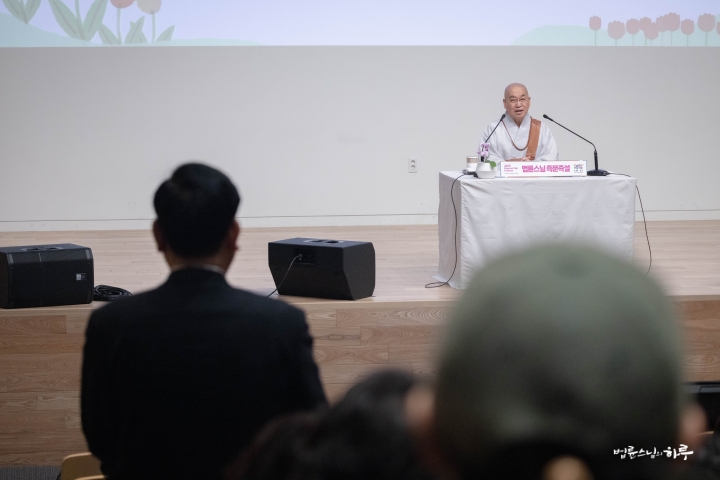
“Who first brought up the idea of divorce, your wife or you?”
“I was the one who suggested divorce first. The biggest issue was that we couldn’t meet each other’s expectations. I thought, ‘After all I’ve done, shouldn’t I receive this much in return?’ while my wife felt, ‘I’ve prepared meals and taken care of everything, what more do you want?’ In terms of daily responsibilities, we both fulfilled our roles diligently, but that wasn’t what we truly wanted. My wife wanted me to be more attentive and caring, while I wanted some time to myself occasionally—to meet friends and get some fresh air. But my wife asked me to inform her in advance before going out, which felt restrictive to me. Eventually, these conflicts kept recurring, and we couldn’t find a compromise.”
“You weren’t ready for married life.”
“That’s correct. Actually, I never intended to get married. But my wife genuinely cared for me, and I came to depend on her emotionally. I decided to marry her because I thought, ‘This person would make a good spouse.'”
“Marriage isn’t just about living together; it’s a commitment to depend on each other to some extent. If you don’t have that mindset at all, you shouldn’t get married in the first place. If you say, ‘I’ll be late today, I’m meeting a friend,’ it’s natural for your partner to ask, ‘What’s the occasion? Who are you meeting?’ If even that feels like interference to you, it’s difficult to maintain a marriage. In that case, it’s better to live alone from the start. So I understand why you ended up divorcing. But this isn’t something you should be sobbing about. 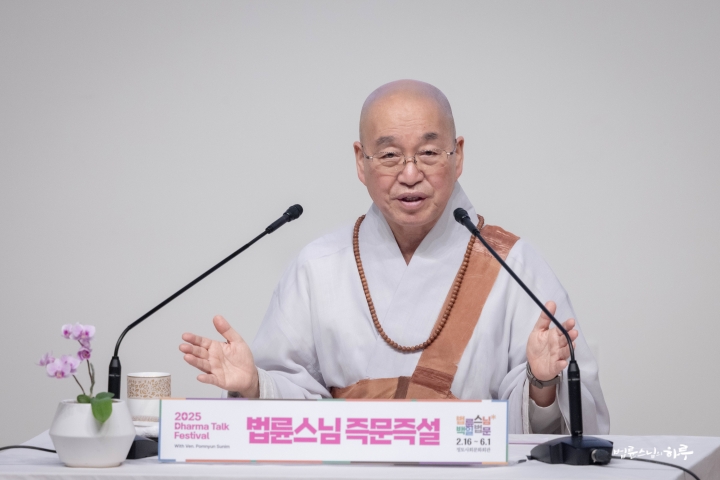
Ladies, please listen carefully to what I’m saying. Just because a man looks decent doesn’t mean he’ll make a good husband—that can lead to serious problems. It seems your wife was attracted to you because you look good and are tall, but being older or earning a lot of money doesn’t guarantee a happy marriage. A marriage can be happy when both people are prepared to live together. When you live alone, you can do as you please, but when you live together, you need to accommodate each other. If you’re ready to adjust, you’re ready for marriage; if not, it’s not yet time. In the past, people thought adjusting to each other after marriage was so obvious that they judged marriageability simply by age. But nowadays, the criterion for marriage isn’t age but ‘Are you ready to accommodate each other?’ If you’re ready at twenty, you can get married; if you’re not ready at sixty, it’s still not time.
You tried to continue your bachelor habits in your married life. When you live alone, you’re free to go wherever you want and spend your time however you choose. But marriage is a community where two people make commitments and live together. That’s why your partner naturally wants to know where you’re going, when you’ll be back, and who you’re meeting. Sharing this basic information is fundamental. If you find this bothersome and consider it interference, you’re not ready for married life. This attitude itself shows that your perspective on marriage was flawed from the beginning.
This can also be explained through the principles of matter. When oxygen and hydrogen are separate, they have none of the properties of water. But when one oxygen atom combines with two hydrogen atoms, a completely new property called water emerges. A property that didn’t exist before is created through this combination. It’s the same with cars. When 20,000 parts are scattered, they have no function on their own. But when assembled according to a blueprint, they suddenly move, light up, and make sounds—new properties emerge. These properties weren’t present in any of the individual parts. Something entirely new is created through combination. 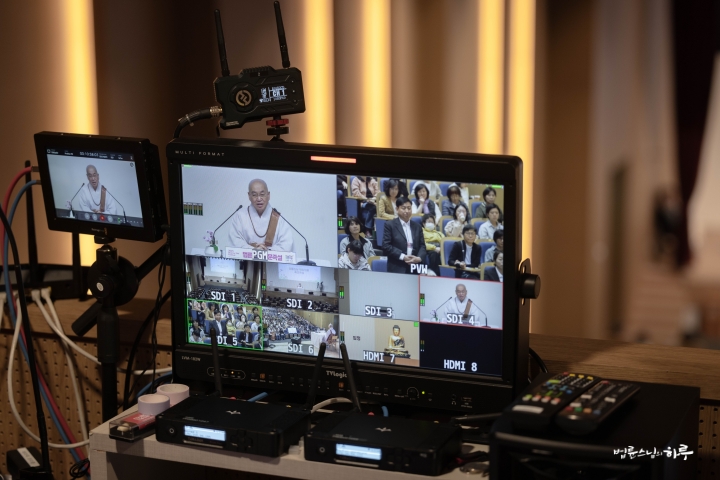
When two people marry and live together, a new quality emerges from that union that didn’t exist before. It’s like how hydrogen and oxygen separately are not water, but when combined, they create water with completely different properties. Qualities that don’t exist when a man or woman is alone emerge when they unite through marriage, creating a new community. Just as separating water returns it to hydrogen and oxygen, divorce separates the couple back into “me” and “you.” However, while living together, they create a “home” with new qualities beyond simply being two individuals. When children are born, a complete “family” community is formed. Thus, marriage isn’t merely cohabitation but creating an entirely new world together.
However, you don’t understand marriage as this new relationship. Thinking that earning money entitles you to corresponding services isn’t the concept of family. That’s a commercial transaction. It’s like viewing the relationship as similar to paying for services at a massage parlor. Marriage isn’t such a transaction. The marital relationship isn’t about calculating what’s given and received, but about sharing together. The attitude that “because I earn more money, you should take better care of me, and I should be free to go wherever I want” applies to relationships between separate individuals, not to a family. Since marriage is a community, you must acknowledge the very fact that your wife can make such requests of you.

In Jungto Society, when living in a community, it’s basic courtesy to say, “I’ll be going out today.” For example, if Sunim has a sore throat and needs to visit a hospital in Busan, he doesn’t just leave without notice. During the morning Barugongyang (formal Buddhist monastic meal), he would share, “After the morning Dharma talk, I’ll go to Busan for treatment and return by 10 PM.” If he’s going to be late, he should inform others by saying, “Something came up, so I’ll be late.” This isn’t an obligation but basic courtesy and order among people living together. Younger generations often see this as interference and leave without saying anything, causing others to wonder where they’ve gone. Even if you’re not married, when living in a community, you must inform others. This is different from workplace surveillance. It’s about voluntarily informing others and being considerate. Life is about communicating and adjusting to one another. Acting on your own without informing others is self-centered. Is the questioner a king and his wife a servant?”
“No, that’s not the case.”
“Marriage is an equal relationship. It’s not right to base a marital relationship on who earns more money or who is more capable. Even if one person is bigger and the other smaller, together they become one. Assets acquired after marriage, regardless of who earned them, are divided equally in divorce. The higher earner doesn’t get to keep more. Of course, assets owned before marriage are excluded, but assets created together after marriage are divided equally regardless of contribution. Whether you get divorced or not is your choice, but the point is—why are you getting emotional as if you did something admirable?” (laughs)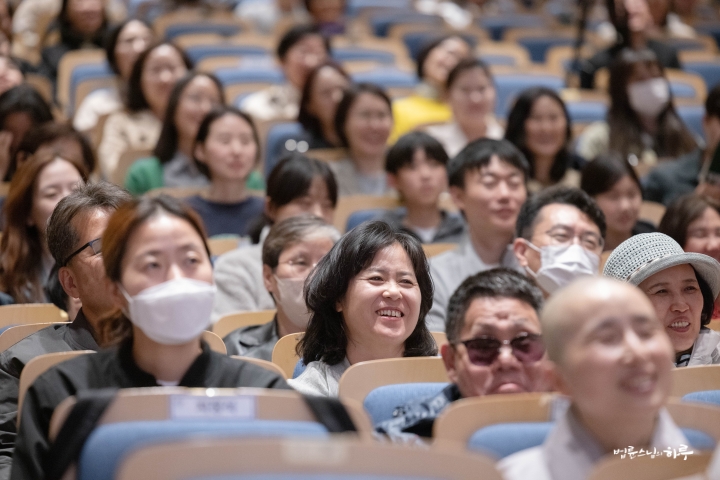
“I miss my child, and I feel like I’ve done something wrong.”
“Then you should reflect on your mistakes, not whimper. This isn’t a time to be overwhelmed by emotions and sob. If you’ve truly realized your mistake, even if you’ve filed for divorce, you can go back the next day and say, ‘I was wrong,’ and start over. If you only want to see your child and not your wife, that’s like wanting to eat the good parts and throw away the peel. Such an attitude isn’t right.
You can stay together or separate. The problem is your attitude toward marriage. If you’ve divorced like that, you should be clear that you won’t marry again. You shouldn’t think that you might marry again if someone better comes along. You should be firmly resolved not to marry again, regardless of what woman appears. If that’s not the case, you need to change your perspective on marriage starting now. You can’t live as you did when you were single. Marriage is about two people coming together to create a new community. This is precisely the law of dependent origination that Buddha taught.”
“I’m actually very embarrassed. My question seems so shallow now. What struck me most from your talk today is that when you form a family, it becomes a completely new community. I think I’ve been living without recognizing this at all. Thank you.”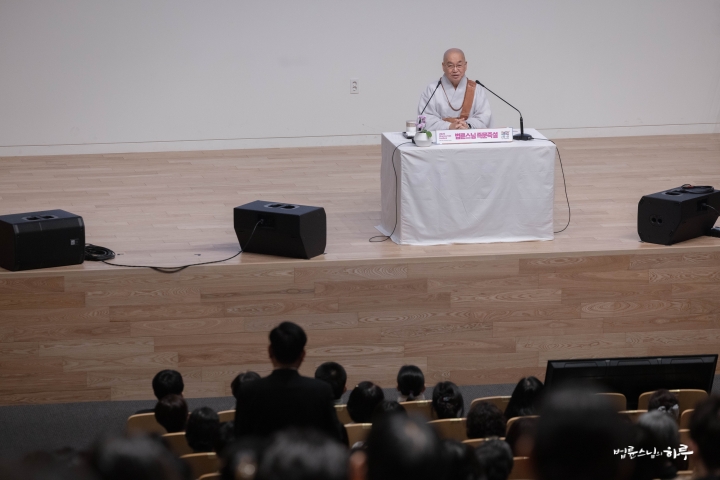
“Try attending the Awakening Retreat. After attending, your mind will feel much lighter. Whether you continue living together or divorce isn’t that important. What matters most, regardless of how you live, is that you live happily. That’s the essence of the Dharma.”
Questions continued to come in.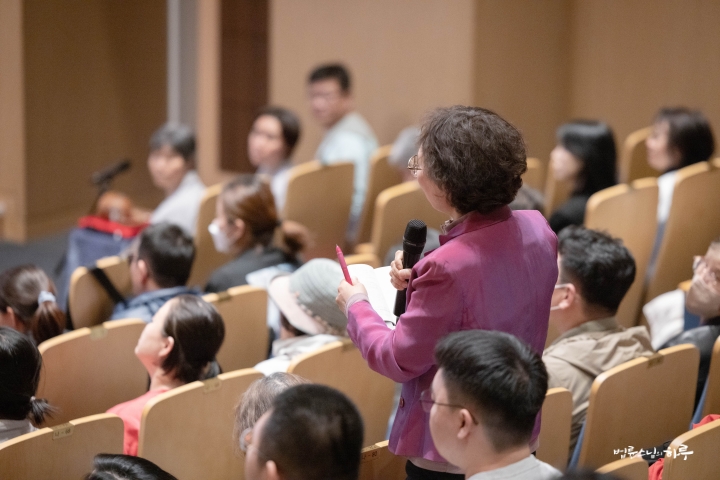
I find it very difficult to work with someone in my department whom I really dislike. I’m wondering how I can feel more comfortable around this person.
I heard there are about 120,000 multicultural foreigners from 88 countries who want to learn Korean. Is there an easy way for them to learn Korean?
I feel small and intimidated among other wealthy parents. How should I understand and manage my discomfort when it comes to spending money?
I live with my eldest son, who reads many Buddhist books and tries to teach me, and I’m worried about his future.
Today, after taking five questions, it was time to conclude. Regretfully, at 12 PM, the lecture ended.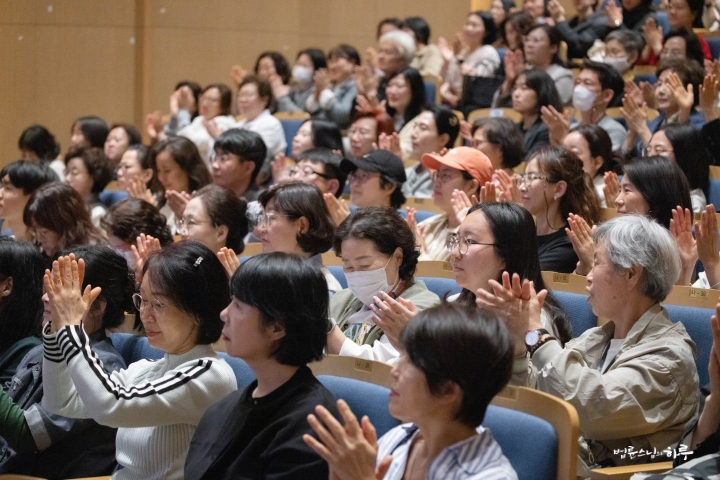
Sunim had lunch with the Sangha in the dining hall on the first basement level. After finishing his meal, at 1:30 PM, he met with the coordinator of The Peace Foundation’s solidarity projects. After discussing inviting the Sri Lankan religious leaders’ group to the International Reconciliation Conference event in July, the meeting concluded.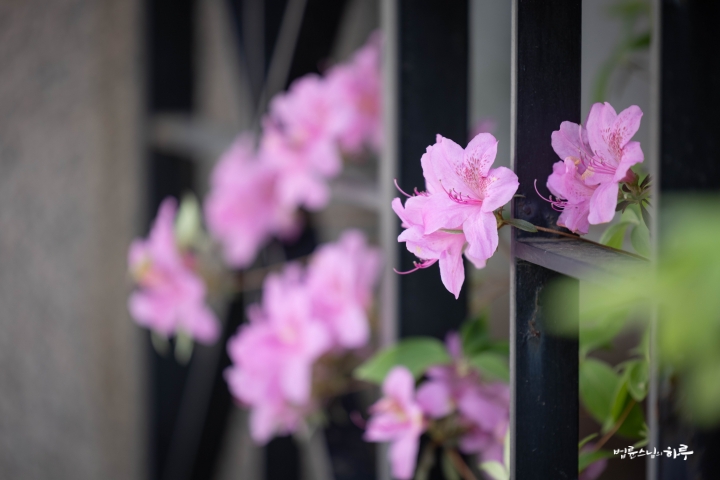
At 2 PM, Sunim discussed with The Peace Foundation staff how to once again inspire hope in today’s discouraged young people, just as he had done 12 years ago through the Youth Concert, which brought hope to the youth of South Korea.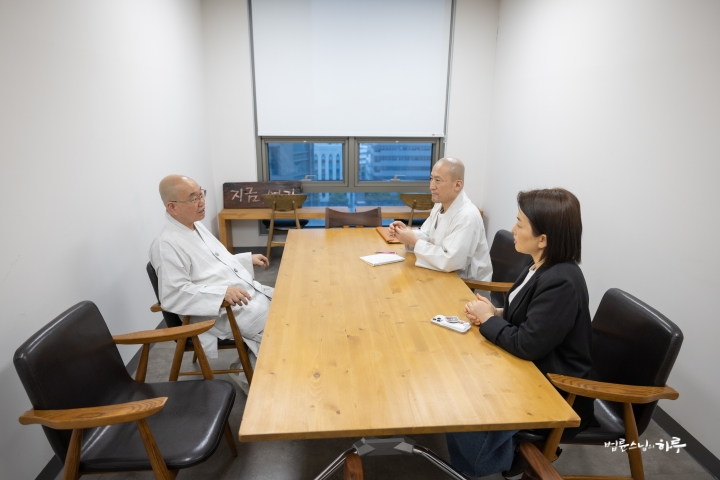
At 3:30 PM, Sunim held an online meeting with the community Dharma teachers. After discussing various topics related to Jungto Society’s operations, the meeting concluded.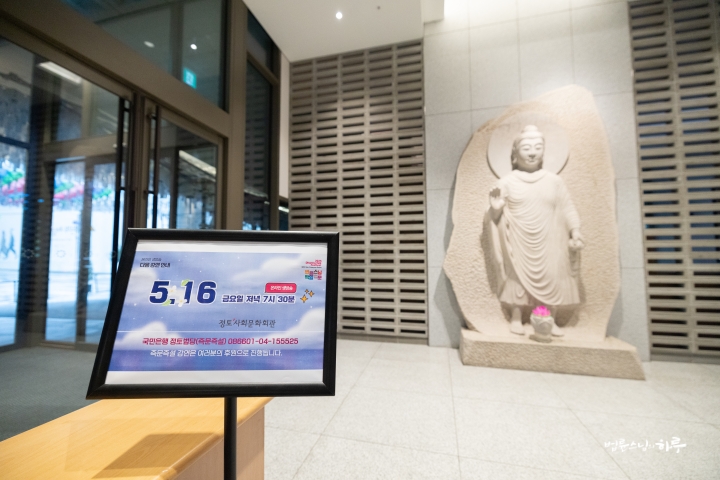
As the sun set, at 7:30 PM, Sunim began the Friday Dharma Q&A for working professionals. Many citizens came to the Jungto Social and Cultural Center after work to attend the Dharma Q&A. About 5,200 people connected via YouTube, and around 160 people were present at the venue.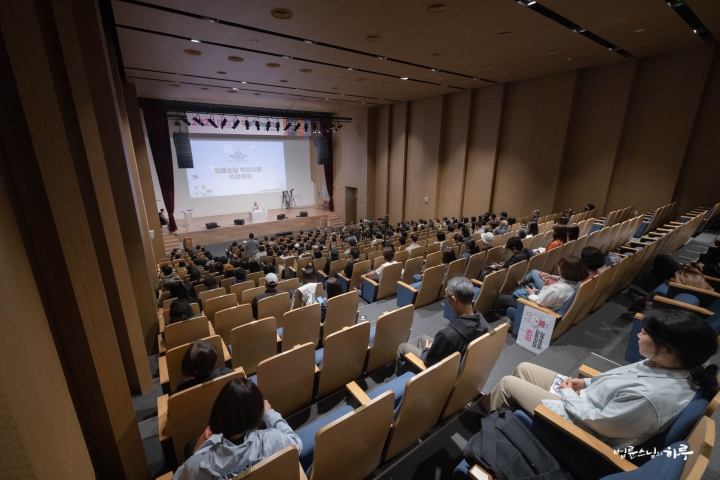
Today, before starting the Dharma Q&A, a special performance was arranged. Singer Maya, a member of Gilbeot, a social service group for broadcasting, film, and theater professionals, gave a congratulatory performance. With her characteristic intense energy and explosive vocal power, she performed the song “Red Sunset,” receiving an enthusiastic response from the audience.
After finishing her song, Maya briefly introduced herself.
“I am Maya, a member of Jungto Society. Thank you for your enthusiastic cheers. I will also take Venerable Pomnyun Sunim’s teachings to heart and be of good use to the world.”
She then sang “I Shout Myself” to thunderous applause and cheers from the audience before leaving the stage.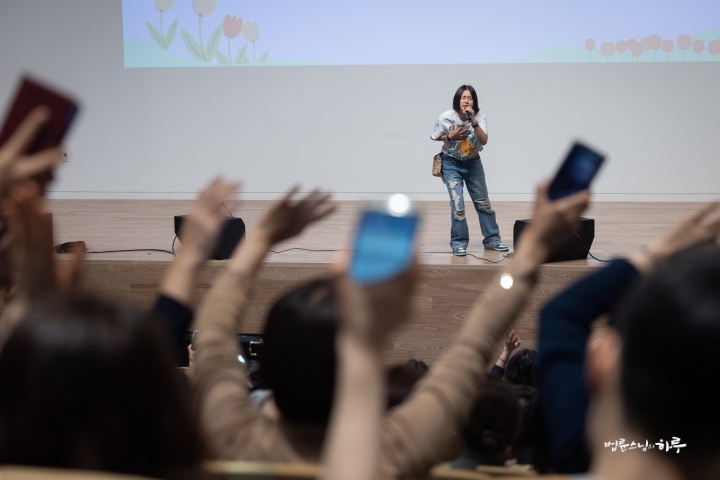
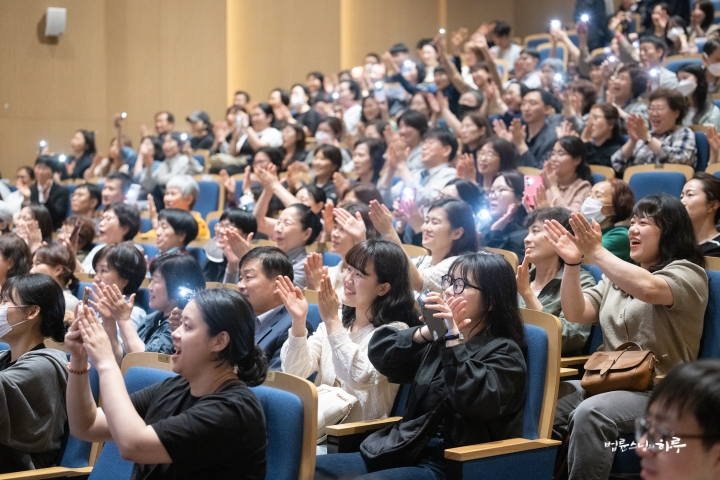
After reciting the Three Refuges and Words for Practice, Sunim took the stage. For an hour, seven people raised their hands and conversed with Sunim. One of them shared concerns about her father, who had lived diligently all his life but recently began frequently enjoying entertainment, wondering how to view this as a child.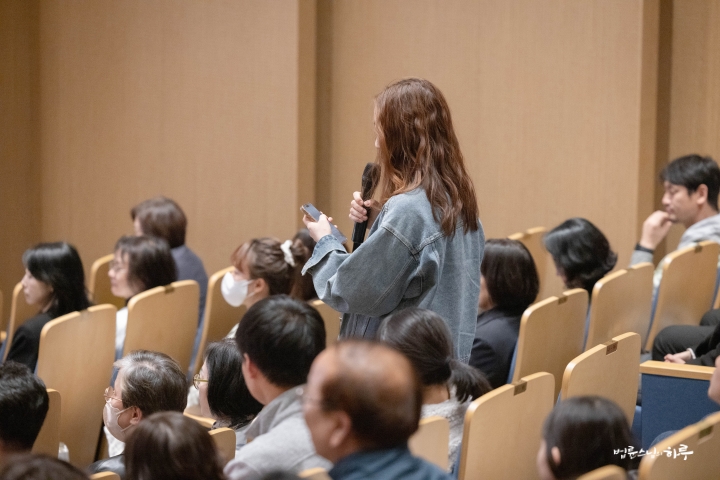
A Father Who Has Fallen into Indulgence After Retirement: What Should I Do as His Child?
“Just leave him be. You said he’s lived diligently all this time, right? Now it’s okay for him to do what he wants. What’s been suppressed in his heart is finally being released. It’s fine to enjoy yourself fully at least once before you die. Your father’s children are all grown up, so don’t worry, and instead encourage him by saying, ‘Have a good time.’ He’s spending his own money, so there’s no problem. If your mother is worried, she could go along with him. Don’t tell your father, ‘Take mother with you,’ but tell your mother, ‘If you’re worried, why don’t you go with him?'”
“I’ll try saying that.”

“I completely understand your mother’s concerns. But just because you’re married doesn’t mean you have to be constrained in everything. Ethics and morality are liberating when followed voluntarily, but when followed reluctantly due to others’ judgments, they become oppressive. When that oppression accumulates, it eventually bursts. From a psychological therapy perspective, it’s natural that some elderly people are now demonstrating with Taegukgi flags in the streets. In the past, they lived in extended families, communicating with their children, but nowadays, even when children marry, they don’t care for their parents, and there’s hardly any communication. After retirement, when children become independent, only the elderly couple remains at home. Society treats them as obsolete, and they themselves feel they’ve lost their value.
The fact that elderly people are now participating in demonstrations that were once done by young people is because they feel recognized as social beings there. They make friends and encourage each other. They develop a sense of mission that ‘I am protecting the country.’ Regardless of right or wrong, they find fulfillment in that space, and their sense of being alive is revived. It might be problematic from a national perspective, but if it’s not severe, it might be better to leave it as is. It was young people who entered the courthouse and destroyed facilities, and they are often intentionally and ideologically biased. In contrast, the elderly mostly just shout or overturn tables. When I was collecting signatures on the street to help North Korean residents facing starvation, some elderly people threatened with umbrellas, hit tables, or threw objects. But they don’t actually hit people. In such cases, it’s best to accept it generously, thinking, ‘They’re relieving stress.’
Just as you watch JTBC, your father watches TV Chosun. There’s no reason to problematize that itself. Just as Christians believe in God and Buddhists go to temples, if it’s something they do because they like it, it needs to be respected. In Buddhism, we are only advised to refrain from the following actions: harming or killing others, stealing or taking others’ possessions, causing sexual harm, lying and cursing, and causing trouble while drunk. As long as these five are avoided, it’s best to let people live as freely as possible. From a child’s or wife’s perspective, it might not be pleasing, but if it’s something they want to do, it’s right not to interfere. He’s not asking his children for money; he’s spending his own money, so there’s no reason to make an issue of it.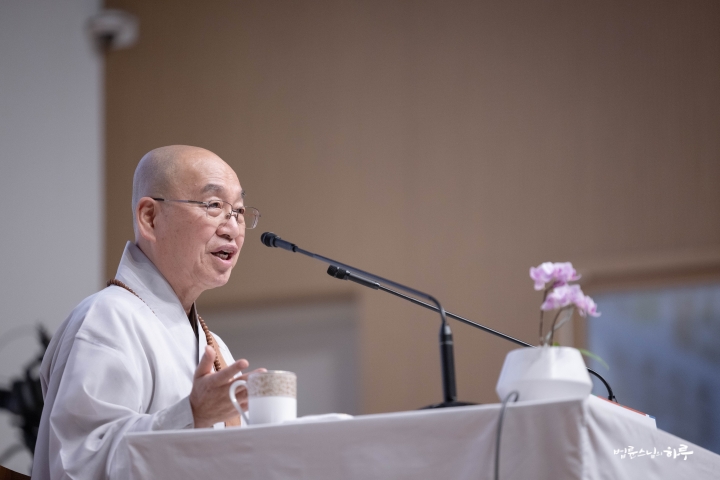
When a father living alone meets a younger woman, the family causes an uproar, saying ‘She’s just after his money.’ That might be true, but consider this: even when you give money to your children, they don’t always treat you well. If this woman takes care of your father well in exchange for financial support, she’s providing value. If you don’t like it, you can step up and take better care of him yourself. You shouldn’t try to control someone else’s life just because they’re family. Even in marriage, if your partner shows interest in someone else, the solution is to treat them better. Binding someone with a marriage certificate isn’t a healthy relationship. If there’s an issue, try talking it through. If that doesn’t work, bring a karaoke machine home, prepare some drinks, and suggest, ‘Dad, let’s have fun at home!’ If that’s difficult, you could join him when he goes out. And if none of that works, sometimes letting go is also an option.”
“My father’s job is already physically demanding, and after going out to have fun, he was so tired the next day that he got into a car accident. Fortunately, he wasn’t seriously injured, but my mother is very worried.”
“Tell your mother, ‘Don’t worry. If he passes away, all his money will be yours.’ It’s not so bad to die doing something you enjoy. Living a long life isn’t necessarily living well. It’s okay to live a life where you do what you want until the end. I understand the concern, but if that’s how he chooses to live, it’s right to respect his choice. When parents farm and give their children pocket money, the children use it to buy coffee and drinks for their partners, and that seems fine. So why interfere when parents spend their own money? We need to view people with a more open perspective. Don’t look at things from such a narrow viewpoint. Of course, if someone’s behavior harms others or breaks the law, it should be moderated. But beyond that, whether it’s parents or spouses, we need to adopt an attitude of letting go a little.”
“I’m actually planning to go to a karaoke place with my father next time. I came here expecting the kind of answer I’ve heard in your Dharma Q&As before, but you’ve given me even more insight than I expected. Thank you.”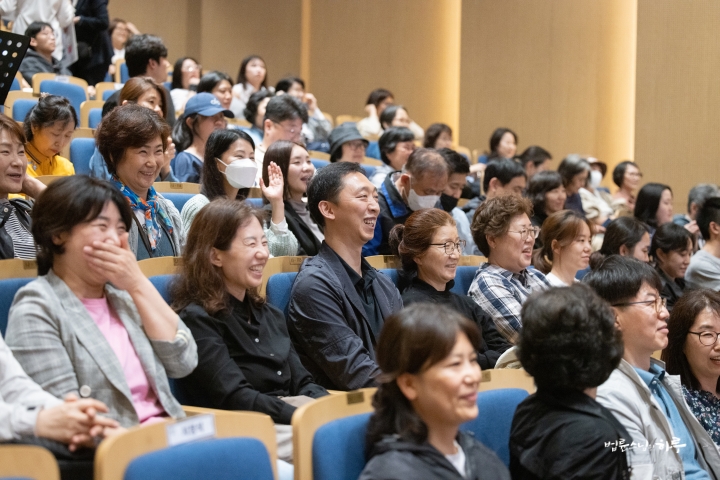
The questions continued.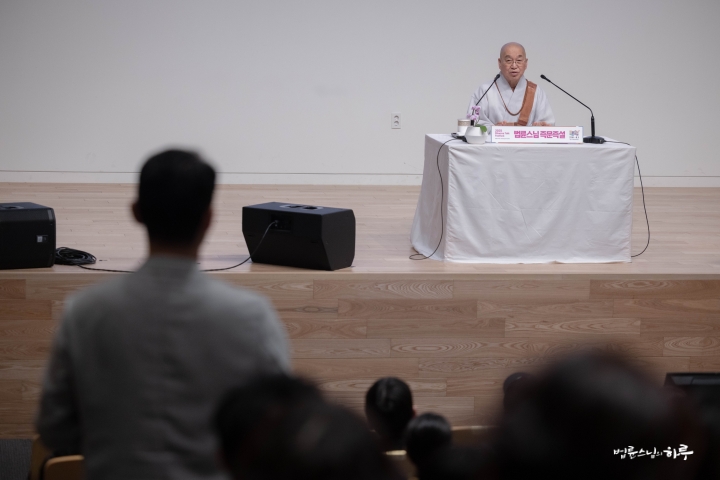
I felt that a male colleague slightly touched my chest at work. I’ve been feeling uncomfortable and can’t stop thinking about it. How should I respond?
A few years ago, I became ill from trying to juggle raising my first child while writing my thesis. The symptoms still persist, and I’m wondering whether I should have a second child.
My younger sibling had been taking care of our 93-year-old mother in our hometown, but after she gave me a bankbook with a large sum of money, my sibling felt hurt, and eventually, I ended up taking care of her. What kind of mindset should I have in this situation?
I found a new job but impulsively quit after just one day. I feel guilty about my high level of anxiety.
By the time the conversation ended, it was 9 PM. Sunim concluded the lecture with the Four Great Vows, promising to meet again at the same time next week.
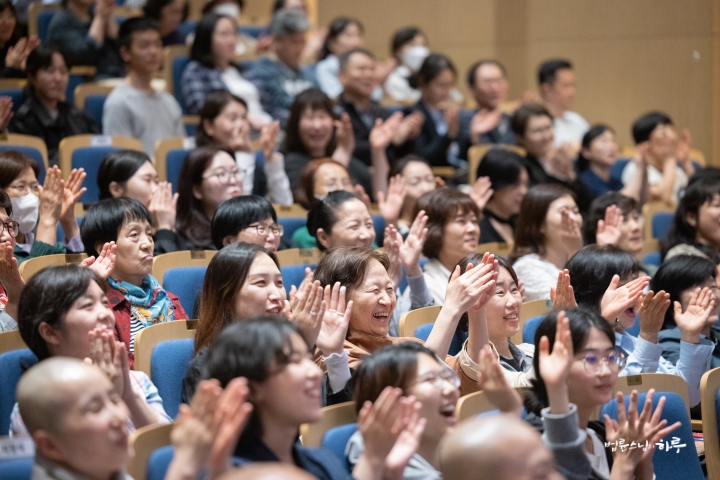
After leaving the lecture hall, Sunim immediately departed from Seoul and headed to Dubuk Jungto Retreat Center.
After driving on the highway for 3 hours and 30 minutes, Sunim arrived at Dubuk Retreat Center at 12:30 AM and concluded his day.
Tomorrow, Sunim plans to work on the farm in the morning and then hold an online Dharma Q&A session with students from the Jungto Dharma School in the afternoon.






Thank you for Sunim’s teaching and insights.